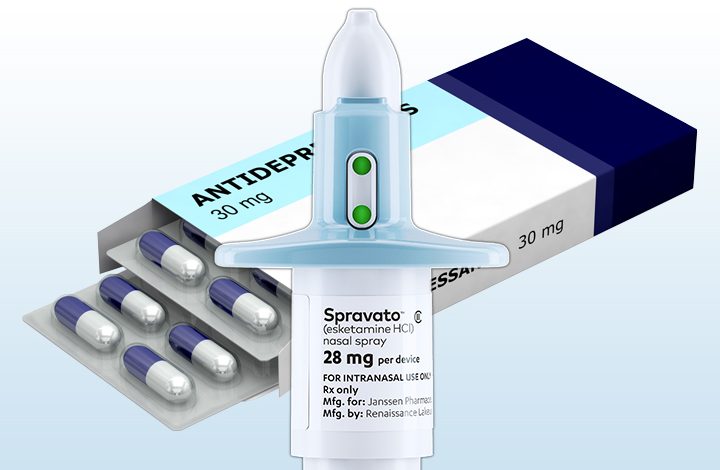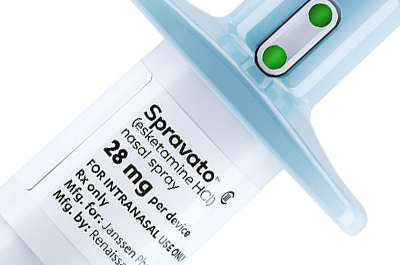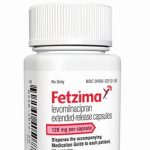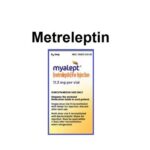Esketamine (Spravato): Uses, Dose, Side Effects, Reviews, Price

What Is Esketamine (Spravato) And What Does It Treat?
Esketamine (Spravato) is an intranasal medication that works in the brain. Esketamine is made from a drug called ketamine, an anesthetic that has also been used for many years to treat depression. But it wasn’t until recently that esketamine, a more potent version of ketamine, earned FDA approval specifically for use as a nasal spray for those with treatment-resistant depression.
Esketamine (Spravato) is approved for the treatment of treatment-resistant depression (TRD) in conjunction with an oral antidepressant. It is also FDA approved for major depressive disorder (MDD) with suicidal thoughts and behavior.
Esketamine (Spravato) is used in combination with other antidepressants when at least two other treatments have failed to treat depression.
Symptoms of depression include:
• Depressed mood – feeling sad, empty, or tearful
• Feeling worthless, guilty, hopeless, and helpless
• Loss of interest or pleasure in your usual activities
• Sleep and eat more or less than usual (for most people it is less)
• Low energy, trouble concentrating, or thoughts of death (suicidal thinking)
• Physical aches and pains such as headaches, stomach issues, or muscle pains
• Psychomotor agitation (‘nervous energy’)
• Psychomotor retardation (moving and thinking in slow motion)
• Suicidal thoughts or behaviors
How does Esketamine (Spravato) work to treat depression?
Esketamine (Spravato), and its related drug ketamine, are highly effective depression treatments for a number of reasons:
- Esketamine (Spravato)’s antidepressant function works through a different mechanism than other drugs. Conventional antidepressants increase levels of naturally occurring chemicals such as serotonin, norepinephrine and dopamine. These chemicals are messengers that relay communication between brain cells. The theory is that having greater quantities of these neurotransmitters allows for better communication between brain cells and positively affects mood.
- Esketamine (Spravato) works in a similar fashion, but unlike other antidepressants it increases levels of glutamate, the most abundant chemical messenger in the brain. The result? A greater impact on more brain cells at one time.
What Is The Most Important Information I Should Know About Esketamine (Spravato)?
Do not stop taking esketamine abruptly, even when you feel better. With input from you, your health care provider will assess how long you will need to take the medicine.
Missing doses of esketamine may increase your risk for relapse in your symptoms of depression.
Physical dependence and potential abuse have been reported with prolonged use of ketamine. This can lead to withdrawal signs and symptoms after abrupt discontinuation or a reduction in the drug dose. Likely withdrawal symptoms associated with esketamine include craving, fatigue, poor appetite, and anxiety. Therefore, patients should be monitored for symptoms of dependence after esketamine treatment has ended.
Esketamine (Spravato) can cause excess sedation (sleepiness) in patients after they receive treatment. You will need to remain in the health care setting for at least 2 hours (or more) until it is determined by the provider that you are safe to go home. You will need to have a caregiver drive you home.
Because of the risk of serious adverse effects resulting from excessive sedation, esketamine is only available through a restricted program called SPRAVATO REMS. Esketamine (Spravato) can only be administered in a health care setting certified in the SPRAVATO REMS Program and to patients enrolled in the program.
What Should I Discuss With My Health Care Provider Before Taking Esketamine (Spravato)?
• Symptoms of your condition that bother you the most
• If you have thoughts of suicide or harming yourself
• Medications you have taken in the past for your condition, whether they were effective or caused any adverse effects
• If you experience side effects from your medications, discuss them with your provider. Some side effects may pass with time, but others may require changes in the medication
• Past or current medical history, especially history of aneurysms, brain bleeds, or allergy to esketamine or ketamine
• Any other psychiatric or medical problems you have, including high blood pressure as esketamine can increase blood pressure.
• All other medications you are currently taking (including over-the-counter products, herbal and nutritional supplements) and any medication allergies you have.
• If you are pregnant, plan to become pregnant, or are breast-feeding
• If you drink alcohol or use drugs

How Should I Take Esketamine (Spravato)?
You will take esketamine nasal spray yourself, under the supervision of the health care provider, who will instruct you how to use it. The dose and when to take the medication, as well as the treatment schedule, may change as the weeks progress.
You will need to remain in the health care setting for at least 2 hours after being treated with esketamine until you are safe to leave. You will need to plan for a caregiver or family member to drive you home after each treatment.
Some people taking esketamine experience nausea and vomiting. You should not eat for at least 2 hours before taking the medication and not drink liquid for at least 30 minutes before taking esketamine.
If you take a nasal corticosteroid or nasal decongestant medicine, take these medicines at least 1 hour before taking esketamine.
What Happens If I Miss A Dose Of Esketamine (Spravato)?
If you miss a treatment session and there is worsening of depression symptoms, inform your health care provider immediately and consider returning to the previous dosing schedule (i.e., every two weeks to once weekly, weekly to twice weekly).
What Should I Avoid While Taking Esketamine (Spravato)?
Do not drive, operate machinery, or do anything where you need to be completely alert after taking esketamine nasal spray. Do not take part in these activities until the next day following a restful sleep. Avoid alcohol, illicit substances, or other central nervous system depressants such as sedatives or opioids as they may increase sedation.
What Happens If I Overdose With Esketamine (Spravato)?
If an overdose occurs, call your doctor or 911. You may need urgent medical care. You may also contact the poison control center at 1-800-222-1222. A specific treatment to reverse the effects of esketamine does not exist.
How Long Does It Take For Esketamine (Spravato) To Work?
Esketamine (Spravato) reaches peak concentrations in the body in between 20 and 40 minutes. It works much more rapidly than traditional antidepressants and is preferred for use in someone experiencing an acute major depressive episode or even thoughts of self-harm.
What is Esketamine (Spravato) treatment like?
Esketamine (Spravato), like ketamine, has the potential to distort your perception during the first two hours after treatment, so it has to be administered in a clinic setting. Treatment for Esketamine (Spravato) nasal spray is done on an outpatient basis.
With the nasal spray, you give yourself three doses, spaced five minutes apart, under doctor supervision. You remain in the clinic under doctor observation until potential side effects have passed.
Esketamine (Spravato) must be used in conjunction with a conventional antidepressant. The intention is that Esketamine (Spravato) provides rapid relief from depression symptoms until the other medication takes effect.
Can a pregnant woman take Esketamine (Spravato)?
If you are planning on becoming pregnant, notify your health care provider to best manage your medications. People living with TRD who wish to become pregnant face important decisions. Untreated TRD has risks to the fetus, as well as the mother. It is important to discuss the risks and benefits of treatment with your doctor and caregivers.
Esketamine (Spravato) is not recommended during pregnancy. There are insufficient data on the medication use in pregnant women to draw conclusions regarding its safety or risk of birth defects, miscarriage, or other outcomes. If a woman becomes pregnant while using esketamine, treatment with this medication should be stopped and the patient should notify the health care provider to discuss the potential risks to the fetus.
Can a breastfeeding woman take Esketamine (Spravato)?
No, breastfeeding is not recommended during treatment with esketamine because it passes into human breast milk and can have adverse effects on the child.
Is Esketamine (Spravato) an effective medication?
Up to 33% of people with depression don’t respond to multiple kinds of conventional antidepressants. Esketamine (Spravato) reduces depression symptoms in a majority of these people in clinical trials.
The only other approved drug therapy for treatment-resistant depression is a combination of olanzapine (an antipsychotic drug) and fluoxetine (a conventional antidepressant). However, this treatment has significant long-term effects that include substantial weight gain, metabolic changes, diabetes, and high blood pressure.
What Are The Possible Side Effects Of Esketamine (Spravato)?
Esketamine (Spravato) nasal spray may cause side effects. Tell your doctor if any of these symptoms are severe or do not go away:
• constipation
• diarrhea
• difficulty thinking or feeling drunk
• dry mouth
• frequent, urgent, burning, or painful urination
• headache
• increased sweating
• nasal discomfort
• nausea
• throat irritation
• unusual or metallic taste in the mouth
• vomiting
Esketamine nasal spray may cause other side effects. Call your doctor if you have any unusual problems while using this medication
.
Is Esketamine (Spravato) a safe medication?
This medication is safe when used as prescribed. However, Esketamine (Spravato) can cause a temporary increase in your blood pressure that may last for about 4 hours after taking a dose. Your health care provider will check your blood pressure before taking the dose, and periodically for at least 2 hours following the dose. Tell your health care provider right away if you experience chest pain, shortness of breath, sudden severe headache, change in vision, or seizures after taking esketamine.
Other serious side effects include problems with thinking clearly and bladder problems. Tell your health care provider if you develop trouble urinating, such as frequent or urgent need to urinate, pain when urinating, or urinating frequently at night.
Are There Any Risks For Taking Esketamine (Spravato) For Long Periods Of Time?
There is a risk for abuse and dependence with prolonged esketamine treatment. Your health care provider should check you for signs of abuse and dependence before and during treatment of esketamine.
What Other Medications May Interact With Esketamine (Spravato)?
Esketamine (Spravato) use with monoamine oxidase inhibitors (MAOIs) may increase blood pressure. Closely monitor blood pressure when using esketamine with MAOIs. These include phenelzine (Nardil®), tranylcypromine (Parnate®), isocarboxazid (Marplan®), and selegiline (Emsam®).
Concomitant use of esketamine with stimulants may also increase blood pressure, and should be monitored closely if used together. These include amphetamines (Adderall®), methylphenidate (Ritalin®), modafanil (Provigil®), and armodafanil (Nuvigil®).
Esketamine (Spravato) use with central nervous system (CNS) depressants may increase sedation. Closely monitor for sedation with concomitant use of esketamine with CNS depressants such as benzodiazepines, opioids, and alcohol. These include, but aren’t limited to, medications such as alprazolam (Xanax®), diazepam (Valium®), oxycodone (Oxycontin®), and hydromorphone (Dilaudid®).
How much does esketamine (Spravato) nasal spray cost?
The price of Esketamine (Spravato) ranges between $590 and $885 per treatment session. The final cost of Spravato treatment will depend on the dose needed and the location you are being treated.
You may also find useful information on Does Spravato Get You “High”?





